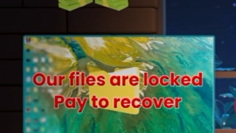Stay Safe from Fake Discounts and Charity Scams
Introduction
Scammers constantly look for new ways to deceive people, often using fake discounts and fraudulent charity campaigns to steal personal and financial information. These scams take advantage of people’s trust and generosity, making them more vulnerable to cybercrime.
In this scenario, Adam receives an email promoting a huge discount, but Omar warns him to be cautious—scammers frequently use fake promotional offers and charity campaigns to trick people into sharing sensitive data.
This article explores how these scams operate, the warning signs to watch for, and the best practices to protect yourself from falling victim to fraud.
How Fake Discounts and Charity Scams Work
Fake Discount Scams
Scammers use fake discount emails, social media ads, and SMS messages to lure victims. These scams often promise massive savings on popular brands or products, leading people to fake websites that mimic legitimate businesses.
Once a victim clicks on a malicious link, they may be:
- Tricked into providing credit card details on a fraudulent payment page.
- Exposed to malware that can steal login credentials and personal data.
- Directed to phishing sites that collect sensitive information.
Fake Charity Scams
Fraudsters also exploit people’s goodwill by setting up fake charity campaigns. These scams involve:
- Emails or calls from scammers posing as representatives of well-known charities.
- Social media posts with emotional stories and donation links to personal accounts.
- Pressure tactics that push people to donate immediately without verification.
In both types of scams, cybercriminals rely on urgency and emotional manipulation to bypass a victim’s critical thinking.
Red Flags to Watch Out For
Signs of a Fake Discount Scam
🚩 Too-good-to-be-true offers – If an email or ad promises an unbelievable discount (like 90% off), it’s likely a scam.
🚩 Suspicious email addresses or websites – Fake sites often have misspellings or unusual domain extensions (e.g., “.net” instead of “.com”).
🚩 No official contact information – Legitimate companies provide clear customer support details.
🚩 Forced urgency – Phrases like “Only a few hours left!” or “Exclusive for you, act now!” pressure victims into quick action.
Signs of a Fake Charity Scam
🚩 Unsolicited donation requests – Be cautious if you receive a sudden call, email, or message asking for donations.
🚩 Vague details about the organization – Legitimate charities provide registration numbers and transparency about how donations are used.
🚩 Unverified social media campaigns – Scammers create fake pages that look real but lack credible endorsements.
🚩 Requests for payment in gift cards or cryptocurrency – Legitimate charities accept standard payment methods.
Steps to Stay Safe from Scams
1. Verify Before Donating or Shopping
Always research before making any transaction. Check official websites and look for independent reviews. For charities, verify registrations through government databases.
2. Avoid Clicking on Suspicious Links
If you receive a discount offer or donation request via email or social media, don’t click on links immediately. Instead, go to the organization’s official website directly.
3. Use Secure Payment Methods
For online purchases or donations, use credit cards or trusted payment gateways that offer fraud protection. Avoid sending money via wire transfer, prepaid gift cards, or cryptocurrency.
4. Look for HTTPS and Security Seals
Before entering payment information, ensure the website has HTTPS in the address bar. Secure sites also display verified security seals from payment providers.
5. Report Suspicious Activity
If you encounter a fake discount or charity scam, report it to the relevant authorities, such as:
- Your country’s cybercrime unit or fraud prevention agency
- The official website of the brand being impersonated
- Your email provider to block phishing attempts
Conclusion
Fake discounts and charity scams are designed to trick you into sharing personal and financial information. Just as Omar warns Adam in the scenario, it’s essential to stay cautious when receiving unexpected discount offers or donation requests.
By recognizing the red flags, verifying sources, and following safe online practices, you can protect yourself from falling victim to these scams. Always remember: if something sounds too good to be true, it probably is!


.png)


















